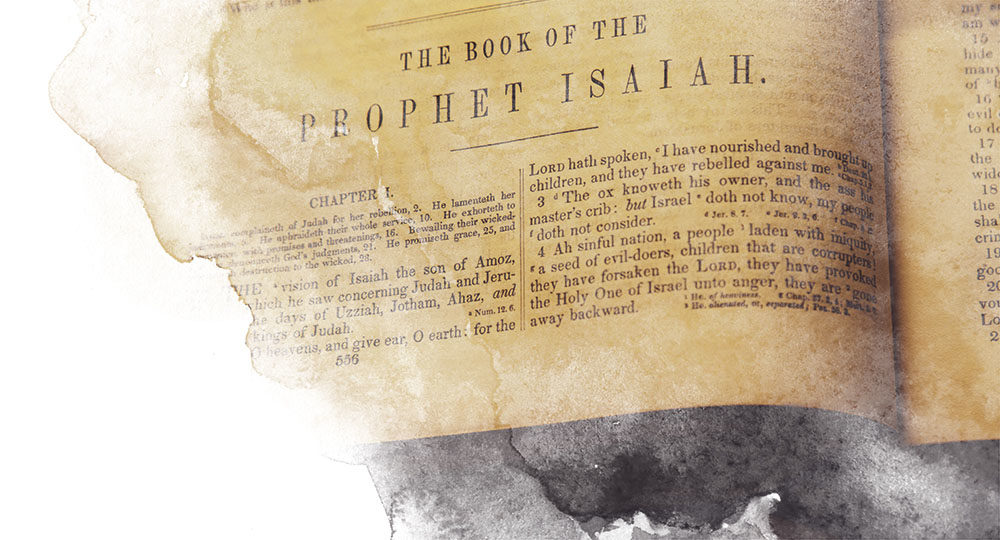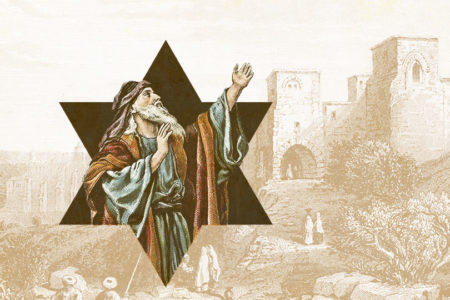Of Whom Does The Prophet Speak? Isaiah 53
Why did the rabbis abandon the clearly Messianic interpretation of Isaiah 53? Dr. Buksbazen explains the reason in this excerpt from his outstanding commentary, The Prophet Isaiah, first published in 1971. All Isaiah quotations used here are from Dr. Buksbazen’s own translation of the Hebrew text. Other Scriptures are from the King James (KJV).
The prophecy of Isaiah 52:13—53:12 is the heart of the second part of the book of Isaiah. Here Messianic vision reaches its pinnacle.
For almost two millennia, Jewish and Christian scholars have debated the question whether the prophet was speaking of himself or of Israel who suffers innocently for the nations of the world. The Ethiopian eunuch touched upon the heart of this question when he asked Philip, an early disciple of Christ, “I pray thee, of whom speaketh the prophet this? of himself, or of some other man?” (Acts 8:34)
Generally, there is little difference between Jewish and Christian translations of this majestic passage of Isaiah, apart from a few words of secondary importance. However, there is a profound and basic difference in the interpretation of the text. Ancient Jewish tradition has for many centuries seen in Isaiah 53 the portrait of the suffering servant of God, the Messiah, a view which still is held to this day by most Orthodox Jews.
However, at the end of the 11th century AD, Jewish commentators began to assert that Isaiah had in mind Israel who suffers innocently for the sins of all nations.
On the other hand, Christians following Jewish tradition have, from the very beginning, maintained that Isaiah 53 is an amazing prophecy concerning Jesus, “the Lamb of God, which taketh away the sin of the world” (Jn. 1:29).
Going back to the oldest Jewish interpretations of this passage, we find that Targum of Jonathan ben Uzziel (2nd century AD), an Aramaic paraphrase of the Bible, renders Isaiah 52:13 in this way: “Behold my servant Messiah shall prosper; he shall be high, and increase and be exceedingly strong.”
The Babylonian Talmud (codified in the 6th century) also applies Isaiah’s prophecy messianically: “The Messiah—what is his name?…The Rabbis say, ‘the leprous one’: Those of the house of Rabbi say, ‘the sick one,’ as it is said, ‘surely he hath borne our sickness’” (San 98b).
Midrash Rabbah, referring to Ruth 2:14, explains:
He is speaking of the King Messiah: “Come hither draw near to the Throne; and eat the bread,” that is the bread of the kingdom: “and dip thy morsel in the vinegar.” This refers to his chastisements, as it is said, “But he was wounded for our transgressions, bruised for our iniquities.”
In the Yalkut Shimoni, a later Midrash (a rabbinical commentary), it is written:
“Who art thou, O great mountain?” (Zech. 4:7). This refers to the King Messiah. And why does he call him “the great mountain?” Because He is greater than the patriarchs. As it is said, “My servant shall be high and lifted up and lofty exceedingly.” He will be higher than Abraham, who says, “I raise high my hand unto the Lord” (Gen. 14:22). Lifted up above Moses, to whom it is said, “Lift it up into thy bosom” (Num. 11:12). Loftier than the ministering angels, of whom it is written, “Their wheels were lofty and terrible” (Ezek. 1:18).
These are only a few of many rabbinical comments relating to Isaiah 52:13—53:12, which, with one accord, apply it to the Messiah.
What caused this radical change in the rabbinical position?
Behind this change lies the tragic Jewish experience during the Crusades. During the First Crusade in AD 1096, when the Crusaders, in their misguided zeal, attempted to wrest the Holy Sepulchre from the Muslims, they became aware that the infidels were not only “the pagan Muslims” in faraway Palestine, but also “the Christ-killing Jews” who were living in their very midst, in so-called Christian Europe. Encouraged by their fanatical leader and frequently incited by high-ranking clerics, the Crusaders committed massacres of the Jews, especially of those who lived in France, Italy, and Germany. Thousands were butchered, their synagogues burned, and their possessions pillaged.
This horrible experience, which lasted for almost two centuries, left a traumatic impact on the Jews comparable only to their later experience under Hitler. From that time on, their revulsion against everything that the Christians believed or represented became more violent and hostile than ever before.
And since the Christians in their frequent disputes with the Jews used Isaiah 53 as one of their main arguments for the Messiahship of Jesus, the Jews felt impelled to reinterpret this prophecy in such a way as to blunt the Christian argument. Since that time, the question of Isaiah 53 took on a heated polemical and emotional character.
Another compelling reason for the abandonment of the Messianic interpretation of the controversial passage was the fact that many Jews themselves became convinced that there is a cogent and strong argument for the Christian position. In fact, many Jews actually converted to the Christian faith as a result of the Christian-Jewish disputations of the Middle Ages.
During that period the outstanding Jewish scholar Joseph Ben Kaspi (1280–1340) warned the rabbis that “those who expounded this section of the Messiah give occasion to the heretics [Christians] to interpret it of Jesus.” About this statement Rabbi Saadia ibn Danan observed, “May God forgive him for not having spoken the truth.”1
In any case, since AD 1096 Jewish interpreters began to teach that Isaiah’s suffering servant was not the Messiah but persecuted and suffering Israel, “who was led to the slaughter like a sheep and opened not his mouth” (Isa. 53:7).
In the light of the Crusaders’ atrocities, this interpretation took on a semblance of verisimility and found much favor among the majority of Jews, but not among all of them. Still the original Messianic interpretation of Isaiah 53 persisted and survived even to the present day. It is preserved in Jewish liturgy for the Day of Atonement in a prayer attributed to Eliezer Ha-Kallir (eighth century AD):
We are shrunk up in our misery even until now! Our rock hath not come to us; Messiah, our righteousness, hath turned from us; we are in terror, and there is none to justify us! Our iniquities and the yoke of our transgressions he will bear, for he was wounded for our transgressions: he will carry our sins upon his shoulder that we may find forgiveness for our iniquities, and by his stripes we are healed. O eternal One, the time is come to make a new creation, from the vault of heaven bring him up, out of Seir draw him forth that he may make his voice heard to us in Lebanon, a second time by the hand of Yinnon.2
From the prayer it is obvious that the Jews of that era believed that the Messiah had already come and were praying that He may come “a second time.” Some of the medieval scholars who interpreted this passage in an individual sense applied it either to Jeremiah or to Isaiah, others to Hezekiah, and some to any righteous person who suffers innocently.
Many of the ancient rabbis were aware of the seemingly divergent elements in the Messianic prophecies. One stream of thought spoke of the suffering Messiah (Isa. 50:5–7 and 53). The other described a triumphant Messiah who will subdue the rebellious nations and establish His kingdom (Ps. 2 and 110). To resolve this problem the rabbis have resorted to the theory of the two Messiahs, the suffering one, called Messiah ben Joseph, who died in battle against Edom (Rome). He is followed by the triumphant Messiah, Messiah ben David, who establishes His kingdom of righteousness after defeating the Gentile nations.3
Another attempt to resolve the seeming contradiction of a suffering and triumphant Messiah is mentioned in Pesikta Rabbati. According to this, the Messiah ben David suffers in every generation for the sins of each generation. Other rabbinical authorities sought to find a solution to this puzzle in various ingenious ways, which did not commend themselves to most Jewish people.
Some rabbinical authorities have postponed the solution of this and all other perplexing questions to the coming of the prophet Elijah, the forerunner of the Messiah, who will make all things clear.4
In the New Testament this problem is solved by the doctrine concerning the First Advent of the suffering Christ, followed by His triumphant Second Coming (Mt. 23:39; Jn. 14:3; Acts 1:11; 1 Th. 4:14–17, etc.).
ENDNOTES
- S. R. Driver and Adolf Neubauer, The Suffering Servant of Isaiah, 203.
- Op. cit., 445.
- Sukkah 246, Soncino edition.
- Baba Metzia 6.









Thank you so much! It seems the crusades did so much more harm than good, what a destructive force in the name of Christianity. This article was enlightening!